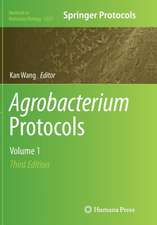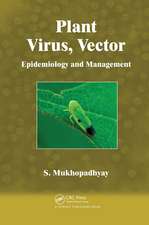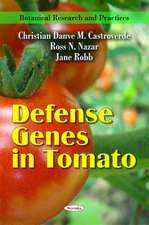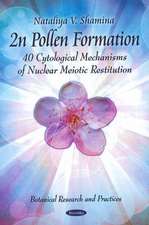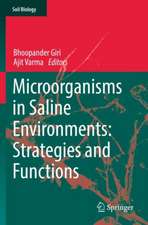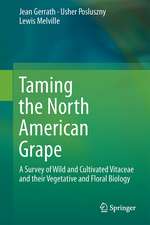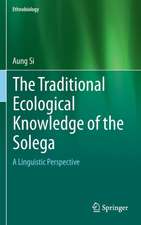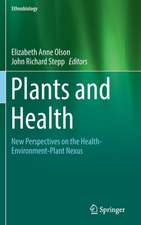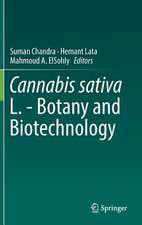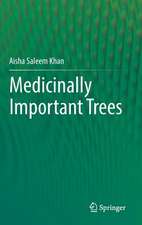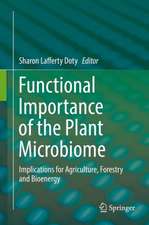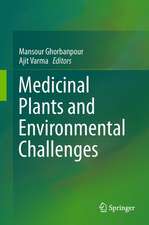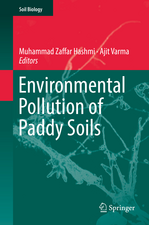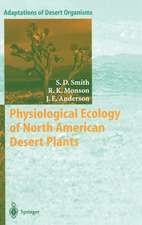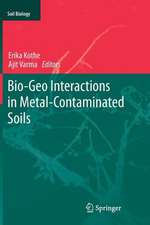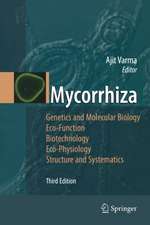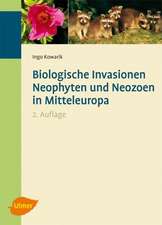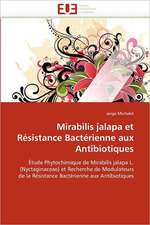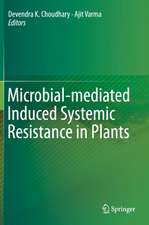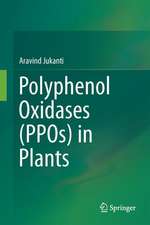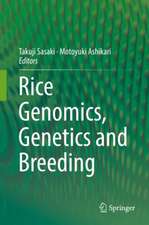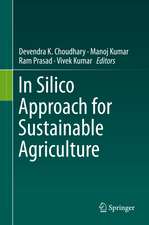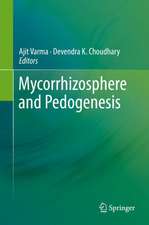Volatiles and Food Security: Role of Volatiles in Agro-ecosystems
Editat de Devendra K. Choudhary, Anil K. Sharma, Prachi Agarwal, Ajit Varma, Narendra Tutejaen Limba Engleză Hardback – 15 dec 2017
| Toate formatele și edițiile | Preț | Express |
|---|---|---|
| Paperback (1) | 791.08 lei 38-44 zile | |
| Springer Nature Singapore – 12 dec 2018 | 791.08 lei 38-44 zile | |
| Hardback (1) | 957.75 lei 3-5 săpt. | |
| Springer Nature Singapore – 15 dec 2017 | 957.75 lei 3-5 săpt. |
Preț: 957.75 lei
Preț vechi: 1167.99 lei
-18% Nou
Puncte Express: 1437
Preț estimativ în valută:
183.32€ • 199.20$ • 154.09£
183.32€ • 199.20$ • 154.09£
Carte disponibilă
Livrare economică 31 martie-14 aprilie
Preluare comenzi: 021 569.72.76
Specificații
ISBN-13: 9789811055522
ISBN-10: 9811055521
Pagini: 485
Ilustrații: XVI, 373 p. 49 illus., 25 illus. in color.
Dimensiuni: 155 x 235 mm
Greutate: 0.8 kg
Ediția:1st ed. 2017
Editura: Springer Nature Singapore
Colecția Springer
Locul publicării:Singapore, Singapore
ISBN-10: 9811055521
Pagini: 485
Ilustrații: XVI, 373 p. 49 illus., 25 illus. in color.
Dimensiuni: 155 x 235 mm
Greutate: 0.8 kg
Ediția:1st ed. 2017
Editura: Springer Nature Singapore
Colecția Springer
Locul publicării:Singapore, Singapore
Cuprins
Chapter 1. Plant Volatile Compounds in Growth.- Chapter 2. Characterization of Bacterial Volatiles and Their Impact on Plant Health Under Abiotic Stress.- Chapter 3. Soil Reclamation Through Phytoextraction and Phytovolatilization.- Chapter 4. Microbial Volatiles in Defense.- Chapter 5. Volatiles in the Rhizosphere: Bioprospecting for Sustainable Agriculture and Food Security.- Chapter 6. Volatile Organic Compounds in Food Security: The Role of Neglected and Underutilized Legumes.- Chapter 7. Plant Volatiles and Defense.- Chapter 8. Microbial Volatile in Defense.- Chapter 9. Plant Essential Oils for Controlling Plant Pathogenic Fungi.- Chapter 10. Bacterial Volatiles: Potential Applications in Plant Growth and Health.- Chapter 11. Bacterial Volatile in Rhizosphere.- Chapter 12. Microbial Volatiles as Chemical Weapons against Pathogenic Fungi.- Chapter 13. Race of Arms: Herbivores Induced Volatiles and their Co-Evolution.- Chapter 14. Potential of Microbial Volatile Organic Compounds for Crop Protection Against Phytopathogenic Fungi.- Chapter 15. Herbivore Induced Plant Volatiles.- Chapter 16. Bacterial Volatiles in Promotion of Plant Under Biotic Stress.- Chapter 17. Fungal Volatile Organic Compounds: Emphasis on Their Plant Growth-Promotion.- Chapter 18. Bacterial Volatiles for Plant Growth.- Chapter 19. Microbial Volatiles and Plant Defense.
Notă biografică
Dr. Devendra K. Choudhary has fifteen years of experience in Microbial Ecology and is currently working as an Associate Professor at Amity University, Noida. Dr. Choudhary has worked on GOI sponsored major projects as Principle Investigator. As an active researcher, Dr Choudhary has published more than 50 research and review articles along with several book chapters for reputed journals and edited books. Dr Choudhary has been recognized as Member of The National Academy of Sciences (MNASc).
Dr. Anil K. Sharma has completed his Ph.D. (1988) in the area mycrorrhiza and rhizosphere biology with special emphasis on basic and applied aspects in bioinoculants, composting and microalgae research. Upon completion of PhD he went to abroad for post doctoral research work as; Research Associate (11/92 – May 94) Department of Biological Sciences, Grambling State University, Lousiana, USA; Visiting Scientist (August 2003 – November 2003) Department of Botany, University of Basel, Basel, Switzerland; Visiting Scientist (September, 2013) Department of Environment Sciences, University of Helsinki, Lahti, Finland. Dr. Sharma has worked on more than 10 international and GOI sponsored major projects as Principle Investigator. He has published more than 100 research reviews paper in reputed journals with impact factor.
Dr. Prachi Agarwal presently working (Since June 2012) as “Program Manager” with Biotechnology Industry Research Assistance Council, Govt of India Enterprise, Ministry of Science and Technology, New Delhi. Dr. Agarwal has pursued PhD in Energy and Environment (2004-2009), from Indian Institute of Technology – Delhi; M.Sc. in Environmental Science (2002-2004) from University of Agriculture and Technology, Pantnagar. Dr. Agarwal has published more than 20 research and review articles along with several book chapters for reputed journals and edited books.
Dr. Narendra Tuteja presently acting as Director, Amity Institute of Microbial Technology (AIMT), Amity University Uttar Pradesh (AUUP), Noida. Before joining AIMT he spent years as Group Leader & Senior Scientist, International Centre for Genetic Engineering & Biotechnology (ICGEB), New Delhi. Based on his contribution to science & society he has been elected as Fellow for various science academies India/abroad; Fellow of "Third Word Academy of Sciences", Trieste, Italy (FTWAS), Fellow of “National Academy of Agricultural Sciences”, New Delhi (FNAAS), Fellow of “National Environmental Science Academy”, New Delhi (FNESA), Fellow of “Indian Academy of Sciences”, Bangalore (FASc.), Fellow of “Indian National Science Academy”, Fellow of “National Academy of Sciences”, Allahabad (FNASc.).
Dr. Varma currently is Distinguished Scientist & Prof. of Eminence at Amity Institute of Microbial Technology (AIMT), Amity University Uttar Pradesh (AUUP), Noida. Dr. Varma has successfully completed major projects as PI sponsored by DBT, DST, DRDO& ICAR. He has supervised more than 69 PhD students and published over 374 research articles for national and international journals of repute, as well as several major review articles and chapters in books. He has published 83 books in the area of Microbial Technology and has been the series editor for Springer-Verlag’s Series on Soil Biology, and has edited fifty volumes on Soil Biology. Dr. Varma has been a member of the National Academy of Agriculture Sciences (FNAAS), International Society of Symbiosis, Boston, USA, Indian Science Congress Association, Executive Council, Amity University Uttar Pradesh.
Dr. Anil K. Sharma has completed his Ph.D. (1988) in the area mycrorrhiza and rhizosphere biology with special emphasis on basic and applied aspects in bioinoculants, composting and microalgae research. Upon completion of PhD he went to abroad for post doctoral research work as; Research Associate (11/92 – May 94) Department of Biological Sciences, Grambling State University, Lousiana, USA; Visiting Scientist (August 2003 – November 2003) Department of Botany, University of Basel, Basel, Switzerland; Visiting Scientist (September, 2013) Department of Environment Sciences, University of Helsinki, Lahti, Finland. Dr. Sharma has worked on more than 10 international and GOI sponsored major projects as Principle Investigator. He has published more than 100 research reviews paper in reputed journals with impact factor.
Dr. Prachi Agarwal presently working (Since June 2012) as “Program Manager” with Biotechnology Industry Research Assistance Council, Govt of India Enterprise, Ministry of Science and Technology, New Delhi. Dr. Agarwal has pursued PhD in Energy and Environment (2004-2009), from Indian Institute of Technology – Delhi; M.Sc. in Environmental Science (2002-2004) from University of Agriculture and Technology, Pantnagar. Dr. Agarwal has published more than 20 research and review articles along with several book chapters for reputed journals and edited books.
Dr. Narendra Tuteja presently acting as Director, Amity Institute of Microbial Technology (AIMT), Amity University Uttar Pradesh (AUUP), Noida. Before joining AIMT he spent years as Group Leader & Senior Scientist, International Centre for Genetic Engineering & Biotechnology (ICGEB), New Delhi. Based on his contribution to science & society he has been elected as Fellow for various science academies India/abroad; Fellow of "Third Word Academy of Sciences", Trieste, Italy (FTWAS), Fellow of “National Academy of Agricultural Sciences”, New Delhi (FNAAS), Fellow of “National Environmental Science Academy”, New Delhi (FNESA), Fellow of “Indian Academy of Sciences”, Bangalore (FASc.), Fellow of “Indian National Science Academy”, Fellow of “National Academy of Sciences”, Allahabad (FNASc.).
Dr. Varma currently is Distinguished Scientist & Prof. of Eminence at Amity Institute of Microbial Technology (AIMT), Amity University Uttar Pradesh (AUUP), Noida. Dr. Varma has successfully completed major projects as PI sponsored by DBT, DST, DRDO& ICAR. He has supervised more than 69 PhD students and published over 374 research articles for national and international journals of repute, as well as several major review articles and chapters in books. He has published 83 books in the area of Microbial Technology and has been the series editor for Springer-Verlag’s Series on Soil Biology, and has edited fifty volumes on Soil Biology. Dr. Varma has been a member of the National Academy of Agriculture Sciences (FNAAS), International Society of Symbiosis, Boston, USA, Indian Science Congress Association, Executive Council, Amity University Uttar Pradesh.
Textul de pe ultima copertă
This book presents research on volatiles produced by microbes and plants along with their biotechnological implications for sustainable agriculture. A greater understanding of how plants and microbes live together and benefit each other can provide new strategies to improve plant productivity, while at the same time helping to protect the environment and maintain global biodiversity. To date, the use of chemicals to enhance plant growth or induced resistance in plants has been limited due to the negative effects and the difficulty in determining the optimal concentrations to benefit the plant. The book discusses extensive studies on biological alternatives that avoid these problems, and the research presented suggests that these compounds could offer an environmentally sound means to better grow and protect plants under greenhouse or field conditions. To understand the nature of VOCs and gene expression profiling of plant genes responding against these compounds can be conducted. Itis possible that VOCs produced by microbes while colonizing roots are generated at sufficient concentrations to trigger plant responses. In conclusion, positive or negative effects of VOCs on plant productivity will be dependent on upon specific VOCs microbial strain, plant genotype, and presence/absence of abiotic/biotic stresses
Caracteristici
Demonstrates the utility of volatile organic compounds in plants growth and defence Explores innovative microbial strategies for plant productivity Enriches the understanding of role and effect of volatile organic compounds under biotic and abiotic stress

